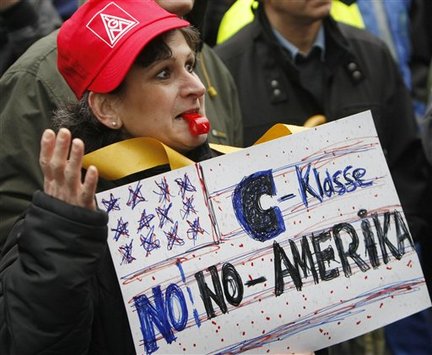
As the UAW targets the U.S. manufacturing plants of German car makers BMW, Mercedes and Volkswagen—most recently filing to hold an ambush election at VW’s Chattanooga, Tennessee plant—one might wonder why unions in Germany (specifically, the German union IG Metall) are helping the United Auto Workers unionize in the U.S.
To put it simply, German unions dislike the fact that the U.S. plants are union-free because they are worried about their own unionized market share.
In 2009, thousands of IG Metall members took to the streets to protest Mercedes plans to expand in Vance, Alabama
“We will not let our jobs vanish to Nirvana without a fight,” Erich Klemm, the workers’ council president told about 12,000 protesters.
Just as the United Food & Commercial Workers has, for years, targeted Walmart because it is union-free—and Walmart’s success has eroded unionized grocers’ market share—German unions view a non-union American model as an erosion of the German unions’ market share.
In fact, one German union boss went so far as to compare the Southern United States to North Korea.
Likewise, the United Auto Workers feels the pressure that the German unions feel, with Bob King publicly stating that the UAW’s survival depends on unionizing foreign car companies’ U.S. plants.
By appealing to German unions for help and by calling on the companies to do the right thing, King hopes to get VW and Daimler to surrender without a fight and let the union make its case directly to workers.
[snip]
“If we don’t organize the transnationals, I don’t think there is a long-term future for the UAW,” King said [Emphasis added.]
In a more recent piece, Reuters further explains what’s at stake and why the unions overseas are so interested in seeing U.S. Plants unionized:
…European unions–facing plant closures at home amidst a deep and lengthy downturn — have been pressuring VW and other German carmakers to give US workers a seat on their global works councils, which gives employees a say in the management of the company.
“The German unions want to see those plants unionized,” said John Russo, a labor specialist at Virginia Tech University.
“They think it is important to their future. They don’t want labor relations in Germany to follow an American model.” [Emphasis added.]
Despite the German union’s endorsement, the United Auto Workers attempt to unionize Volkwagen’s employees in Tennessee isn’t the UAW’s first foray in penetrating the German car maker.
In the late 1970s, the UAW succeeded in unionizing a Volkswagen plant in Pennsylvania–only to see it shut down a decade or so later due to, in part, the UAW’s militant strikes.
Similarly, the UAW also succeeded in unionizing a GM-Toyota joint venture–called NUMMI–only to see that plant closed as well
WARNING: GRAPHIC LANGUAGE–UAW Meeting Erupts as UAW Boss Tells Members To “Shut the F**k Up!”
Regardless, of the German unions’ collusion with the UAW to ambush U.S. auto workers into unionizing, many are beginning to see through the efforts and are fighting back.
Volkswagen employees have formed a nonprofit organization called Southern Momentum and asked executives at the company to allow them to discuss “alternative methods of worker representation” at the local plant.
Headed up by Volkswagen employee Mike Burton, who also created the No2UAW website, the workers sent a letter to CEO Frank Fischer with two requests.The first request is for access to the VW conference center or training center to discuss alternative organization possibilities.
“Volkswagen team members are entitled to be provided with all available information concerning their options, as well as the potential implications of those choices,” Burton said in the letter, obtained by Nooga.com Monday morning. “We are simply asking that the team members be provided with information to assist them in making an informed decision.”
The Volkwagen employees in Chattanooga are set to vote on February 12-14.
While VW management has given the UAW access to its employees on company-paid time, so far, it has refused the VW employees’ Southern Momentum the same access.





